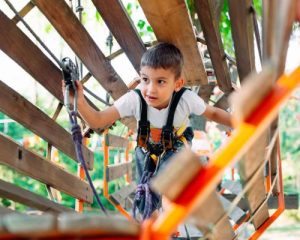 Good health and wellness practices for children with autism are important to overall well-being.
Good health and wellness practices for children with autism are important to overall well-being.
There’s a lot for parents to process when a child receives a diagnosis of autism.
And there are some important needs to tend to beyond behavioral symptoms. Oftentimes, health and wellness practices can be compromised by symptoms and behaviors associated with autism spectrum disorder (ASD). It is important for parents to make health and wellness a top priority for children with ASD to make a difference in their lives now, and for years to come.
Feeling a sense of belonging within a community is an extremely important component of maintaining mental wellness. When a child with ASD is given the opportunity to participate in group activities or community events they are able to foster a sense of belonging and friendship.
This feeling also translates to caregivers and parents — it’s knowing that your child can participate in events or activities without feeling singled out or judged.
The Center for Autism & Neurodevelopmental Disorders (CAND) at UCI Health provides wellness programs to promote the health and well-being of individuals. For example, some of those programs and activities include musical performances in partnership with the Pacific Symphony’s Heart Strings Program, dance and music classes in partnership with the Segerstrom Center for the Arts, and art and creativity workshops in partnership with the Chuck Jones’ Center for Creativity.
Wellness encompasses the many choices you make toward a healthy and fulfilling life, including hygiene habits. Children with ASD may have a more difficult time developing healthy hygiene habits as they are sensitive to the stimuli associated with many of these tasks. Physical limitations and behavior problems may also make tending to personal hygiene more difficult.
When explaining the physical changes of puberty, it is important to speak about the process in a very factual matter. This way, the child is able to fully comprehend what will happen to them, how to deal with it and ultimately feel empowered to ask questions.
By mastering these adaptive skills, children with ASD have the opportunity to become more independent.
It’s equally as important to protect the health of children with ASD by adopting healthy habits in the areas of sleep, fitness and nutrition. These are absolutely vital to maintaining overall health and well-being.
Sleep
Sleep problems including trouble falling asleep and staying asleep are very common, and are reported as high as 80 percent in children with ASD. An additional problem related to sleep is waking up early, which can be caused by stress or excessive use of screen time such as TV, computer, video games, etc. Sleep problems or insufficient sleep are associated with restricted and repetitive behaviors, anxiety or sensory problems and may cause inattention, restlessness, anger and tantrums.
The quantity and quality of sleep for children with ASD is often directly affected by changes and alterations in their sleeping conditions and routines. Establishing good sleep hygiene to ensure your child gets a solid night’s rest by following a consistent bedtime routine and a regular sleep schedule is important. Parents can also speak to their healthcare provider about additional relaxation strategies and sleep aids to improve their child’s quality of sleep.
Fitness
Research at CAND has shown that children ages 6 to 11 with ASD exercise less compared to typically developing children.
Exercise is proven to have positive effects on mental and behavioral health. Physical activity improves bone density, attention, concentration and organizational and motor skills, and reduces problem behaviors.
Parents and caregivers are encouraged to implement a suitable physical activity routine. This can be anything from a walk around the neighborhood to a friendly game of backyard soccer. The goal is to get your child moving, if necessary, through a rewards program in order to improve physical and mental health and reduce the risk of any chronic health problems.
Nutrition
In addition to physical exercise, nutrition plays an integral role in development and an overall healthy lifestyle. Nutrition and diet can be deficient in children and adolescents with ASD due to rigid, restricted taste and food preferences.
As a result, over half of children with ASD take vitamins such as vitamin D and calcium, which are important for a healthy immune system and bone health. Eating a balanced diet rich in protein, iron and calcium from milk products and leafy greens, as well as phosphorus from milk, beans and nuts has proven to be beneficial for children with ASD.
Awareness regarding health and wellness can significantly improve the life of a child with ASD, and allow each child to reach his or her full potential.
Hazel Benavides Vickers, MA, BCBA, ESDM certified, Behavior Intervention Division lead at The Center for Autism & Neurodevelopmental Disorders, UCI Health.
Dr. Jean Gehricke, associate research director, The Center for Autism & Neurodevelopmental Disorders, associate professor, Department of Pediatrics, University of California, Irvine.
Top Photo:Leo Rivas
Center Photo: The Center for Autism & Neurodevelopmental Disorders (CAND) at UCI Health provides wellness programs to promote the health and well-being of individuals, including musical performances in partnership with the Pacific Symphony’s Heart Strings Program.












Leave a Reply